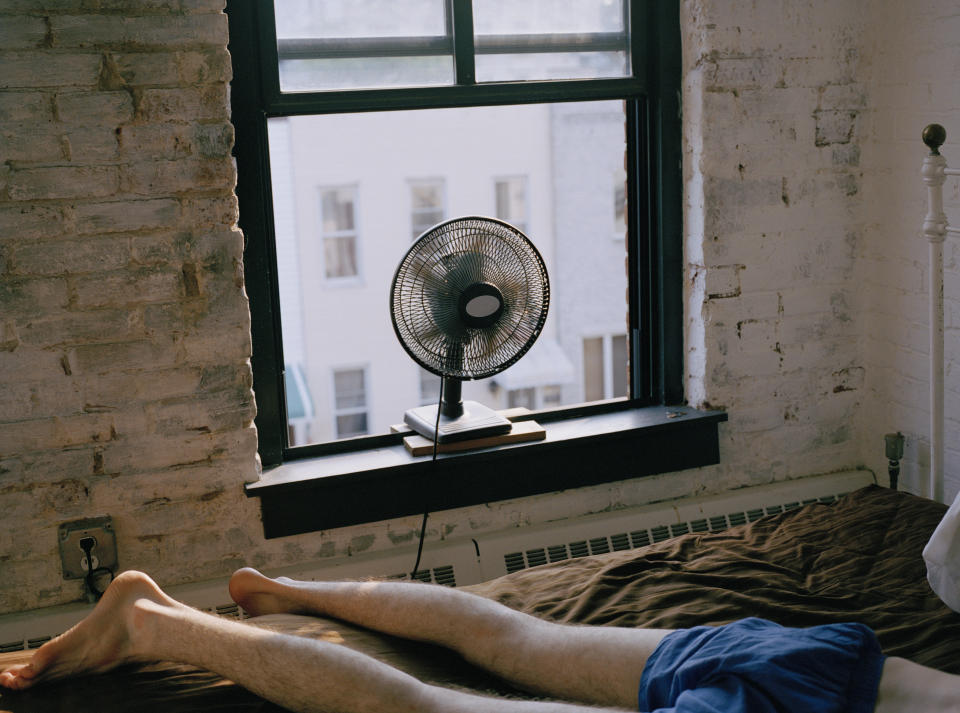Hot weather: Why sleeping with a fan on might be bad for your health

The UK is enjoying something of a September heatwave, which is lovely and all, but the unseasonably hot weather has left many of us trying to stay cool enough to sleep.
While many are turning to fans to provide a welcome breeze for the balmy evenings, experts suggest there are a few things to think about when leaving the fan on all night, from triggering allergies to drying out your skin.
Health risks from sleeping with a fan on
Allergies
Bad news for those who struggle with hay fever, using a fan can actually trigger allergies.
As the fan moves air around the bedroom, it carries pollen along with it increasing the chances of it making its way into your sinuses.
"Fans are not a great option for those with allergies or asthma as they stir up dust and allergens that may be in your room, which can trigger such conditions," explains Lisa Artis, deputy CEO of The Sleep Charity.
If its dust which proves problematic for you, then make sure to clean the blades on a daily basis to prevent the spread of particles every time you switch it on.
"And give your room a good dust before you set your fan up or try opening windows instead," Artis adds.
Dry skin
Another problem which may arise from sleeping by a fan is dry skin.
"Sleeping with a fan on can also dry out your skin, throat and eyes, leading to irritation, especially for those with an existing condition," Artis advises.
"Using a humidifier alongside a fan can help mitigate this problem. Alternatively, point the fan away from you, so that it is still near but not directly pointing at your face."
Congestion
Prolonged use of electric fans can dry out the air, causing the body to produce more mucus to stay hydrated.
"This can result in a stuffy nose, sinus headache, and other discomforts," advises Martin Seeley, the CEO and sleep expert at MattressNextDay.
"Staying well-hydrated by drinking at least two litres of water throughout the day can help combat this issue."
Meanwhile, a nearby glass of water will also prevent you from waking up in the middle of the night with a parched mouth.
Muscle pain
Directing cool air from an electric fan onto pre-existing muscle pains can cause muscles to tense and cramp, resulting in more discomfort, warns Seeley.
Benefits of short-term fan-use
While keeping a fan on all night isn't always advised, there are some benefits to switching them on for the short-term.
"Sleeping with a fan on can be beneficial to maintain a steady temperature, especially when experiencing a heatwave," Artis explains.
"The main benefit of using a fan is to help regulate the temperature in your bedroom. Fans circulate air, which can make a room feel cooler and more comfortable, especially during these hot nights."
To up the ante on the cool air Artis suggests putting a tray or bowl of ice in front of the fan to chill the room even more.
The white noise of a fan can also help some people nod off.
"Fans can generate a consistent and soothing white noise that can help to tune out the sounds of a busy street or snoring partner," advises Artis.
"When the weather is hot, these disruptions can seem especially loud or irritating, so the white noise of a fan could help you to drift off."
But though some find the sound of a fan soothing, others find it annoying and disruptive.
Watch: How to exercise safely during a heatwave
How to sleep in a heatwave
According to the The Sleep Charity, there are a number of ways to keep cool in a heatwave without having to always resort to using a fan.
Open windows – and doors – to create a cool draught through your bedroom. Draw curtains or blinds during the day to block the sun out and keep your room cooler at night.
If you’ve got an attic, try opening the hatch. Hot air rises and this will give it somewhere to go.
Get rid of the duvet and blankets and sleep with just a cotton sheet – or a duvet with a low tog rating.
Wear light cotton nightwear – this is actually better than wearing nothing at all as natural fabric will absorb any perspiration.
Have a cool shower or bath before bedtime to lower your core body temperature.
Drink plenty of cold water during the evening and keep a glass by the bed.
Avoid too much caffeine, alcohol or a big meal before bedtime as this can make you feel hot in the middle of the night because of dehydration and over-active digestion.
Pull out your hot water bottle, but fill it with ice cold water and have it in bed with you.
Chill a pillow case in the fridge before bedtime or try one of the new cooling pillows that are available to buy – both will help you keep a cool head!
Shop a top-rated cooling pillow
LIVIVO Cooling Gel Pillow | £6.99 from Amazon

Tanness 2 Pack Gel Cooling Mat | £8.99 (Was £9.99) from Amazon
Shop a top-rated cooling fan
Honeywell HT900E Turbo Fan | £21.99 (Was £29.99) from Amazon



